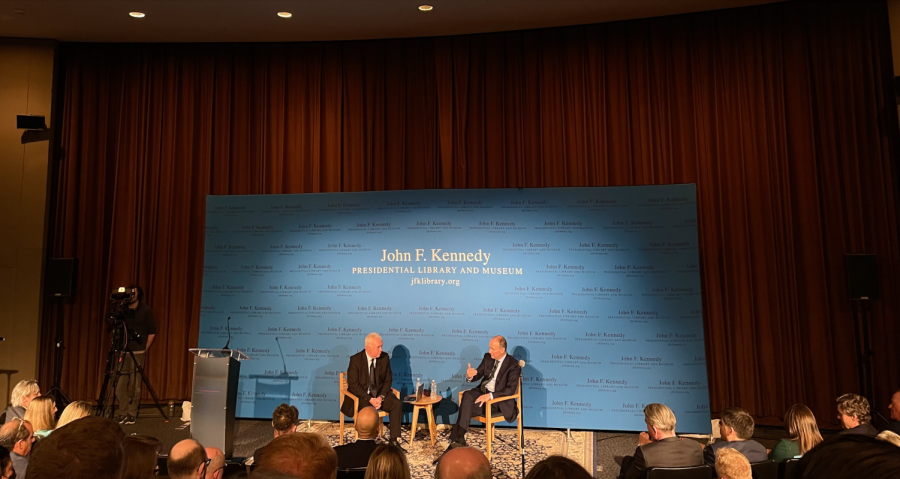Tánaiste Micheál Martin discusses unique Irish-U.S. relationship at St. Patrick’s Day forum
Tánaiste Micheál Martin (right) addresses an audience beside Boston Globe journalist Kevin Cullen (left) at the John F. Kennedy Library on St. Patrick’s Day. Martin spoke on U.S.-Ireland relations at the event.
March 26, 2023
Ireland and the United States share a unique relationship, centered upon the sharing of values and culture through the immigration of Irish people into America, Tánaiste Micheál Martin told the audience at the John F. Kennedy Library forum St Patrick’s Day.
Sixty years ago, John F. Kennedy embarked upon a visit to Ireland, inspiring confidence that “the only limitations the Irish faced were those they placed upon themselves,” Martin said, “which is a value still intact today.”
JFK became the first Irish-Catholic president when he was elected in 1960, proudly celebrating the legacy of his great grandfather who left Ireland to become a copper in East Boston back in the 1800s.
At the time of JFK’s visit, Martin was only three years old.
“I understood a young, Irish leader was saying ‘answer the call,’ which had a profound impact on the national psyche,” Martin said.
The visit strengthened the relationship between Ireland and the U.S., which continues today as President Biden plans to travel over for the 25th anniversary of the Good Friday Agreement, which alleviated 30 years of violent conflict in Northern Ireland.
“The ongoing support of the U.S. remains invaluable,” Martin said. As the minister for foreign affairs and minister for defence of Ireland, Martin maintains close ties with the U.S.
Kevin Cullen, a veteran reporter at The Boston Globe, moderated the conversation with Martin.
“What if Jack Kennedy lived?” Cullen said. “What would he have done about the conflict between Britain and Ireland?”
“JFK would have had the moral authority to move things past,” Martin said, believing Kennedy’s Irish roots compelled a brokering by the U.S. on Ireland’s accord.
Upon later conversation, Cullen said he did not agree with Martin on this point.
Despite JFK’s personal love for Ireland, historically, the U.S. has a tighter-knit alliance with Britain, Cullen explained, leading him to believe JFK would have taken Britain’s side in maintaining control over Ireland during the period known as “The Troubles,” before the Good Friday Agreement was enacted in 1998.
“What changed after JFK’s time was a very political moment in which the American government decided the Brits and the Irish were equals, which is extraordinary,” Cullen said.
This acceptance of Ireland by the U.S. was when “empathies aligned,” according to Martin.
The relationship between Ireland and the U.S. is particularly prominent in Boston, where Irish culture is displayed in local restaurants, cultural organizations and notable celebrations like the annual South Boston St. Patrick’s Day Parade.
“There are frequent reminders in Boston of the importance of the Irish-U.S. relationship,” said attendee Nicolas Stone Perez, a second-year MIT student. “I say to people a lot when they ask me about it: the Irish culture has really shaped my upbringing.”
“Walking around Boston reminds me a lot of Dublin or Galway,” Stone Perez said. “Fellow Irish people have even stopped me on the street to point out my [Gaelic Athletic Association] shirt.”
Massachusetts has a long history of Irish immigrants who helped shape the state, according to attendee Michael Dwyer, a Cork County native who resides in Boston.
“Education has improved leaps and bounds,” Dwyer said, detailing Irish programs which allow citizens to study in America.
A member of the Irish American Cultural Institute, Dwyer hopes to organize a convention next September honoring the Irish contribution to Massachusetts, he said. Throughout the forum, Dwyer held a letter in his jacket pocket intended to reach the hands of the Tánaiste, requesting an Irish Navy ship for the event.
There was an excited buzz in the air, as a room full of both Irish natives and interested locals embraced Martin’s comments with agreement and celebration. When Cullen asked Martin’s opinion of the recent Windsor Framework, Martin said, “If it can be simplified, let’s do it.”
“The younger generations of Northern Ireland can really look forward to a settled economic situation because business and investment needs political certainty and political stability,” Martin said. “I think the Windsor Framework does give that opportunity.”
Reflecting on his meeting with President Biden last year, Martin said Irish values play a pivotal role in foreign relations, global health security and hospice care.
“Ireland cherishes the dignity of a human being,” Martin said. “We both agreed on that dignity and how he saw that as a distinctive Irish value.”
Martin said these Irish values can be seen in the more than 75,000 Ukrainian refugees welcomed into the country since the war with Russia began in February 2022, who now make up 1.5% of the total population. Grand applause ensued with this comment, uniting the audience in support of Ukraine.
Regarding present-day relations between Ireland and the U.S., Martin said, “I think we both still have a lot to learn from each other.”


















